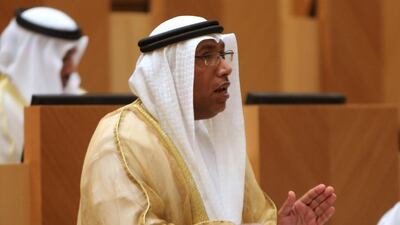ABU DHABI // Individuals linked to groups named as terrorist organisations were warned on Wednesday they face prosecution.
The list of 83 groups published by the Cabinet for the first time last month does not name individuals, but that would not exempt them from trial under anti-terror law, said Ahmed Al Zaabi, a lawyer and chairman of the Federal National Council’s legal and legislative committee.
“This is where the issue lies. They would be considered terrorists.”
Mr Al Zaabi said groups who believed they had been unjustly labelled were entitled to appeal to be removed from the list. “They have the right to speak to the Cabinet and tell them they are not terrorist organisations and do not finance terrorist groups.”
The list included the Muslim Brotherhood, ISIL and Al Qaeda, long designated terror groups, but other organisations were surprised by their own inclusion.
Islamic Relief, an international aid agency and UK-registered charity, said at the time: “We abhor terrorism in all its forms, and we categorically refute any allegation of links to terrorism and any such accusations.”
The agency said it would take the matter up with the UAE Embassy in London, “with a view to having this wrongful listing removed”.
Mr Al Zaabi said the anti-terror law, which the FNC passed this year, gave the Cabinet the full right to remove or add to the list.
But he said no group would be added to the list unless they were involved in terrorist activity.
“A terrorist isn’t just someone holding a sword who kills,” he said. “It is through finance, fostering ideologies. Even a retweet of a terrorist ideology would be considered a terrorist act.”
For instance, anyone who sympathised with or tried to justify the actions of the person who killed the American teacher Ibolya Ryan and planted a bomb in front of an Egyptian-American’s home would also be considered a terrorist, he said.
“This person would also be considered under the law.”
Ahmed Al Mansoori, an FNC member and political analyst, said the Government was aware of some organisations’ objections to their inclusion on the terror list, but the UAE had its reasons for adding groups to the list.
“As a country, we have every right to defend our national security.”
He said the list was a good “preventive” measure to ensure UAE nationals steered clear of such groups.
While the list was a fine example of the Government’s transparency on the matter, he said those affiliated with these groups should also know they are not welcome in the UAE.
Mr Al Zaabi said anyone inside the country affiliated with such groups should disavow them or risk being tried in court. Convicted terrorists face execution or life in prison.
Dr Mohammed bin Huwaidan, chairman of the political science department at UAE University, said the list ensured other countries were aware of the UAE’s boundaries.
“It was also necessary in line with the UAE’s strong leading stance to promote moderate Islam,” he said. This could be achieved only by denouncing groups that did not fit with the country’s vision.
“The UAE has taken a strong stance and if it wants to spread moderation then it needs to fight anything opposing or hindering this,” he said.
“We noticed this when the UAE started fighting ISIL, even though it has put the country in danger. They took a clear position. It’s not just words, its actions.”
osalem@thenational.ae

